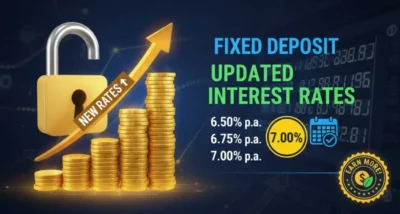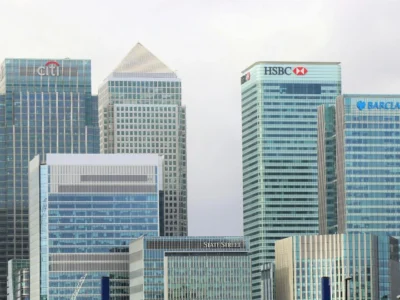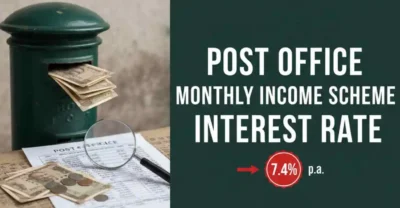Fixed Deposit Updated Interest Rates in India: If you’re someone who likes the idea of guaranteed returns without taking the stress of market ups and downs, then you’ve probably considered Fixed Deposits (FDs). In India, FDs are one of the most popular savings tools, trusted by millions for decades. But here’s the catch—FD interest rates vary widely depending on the bank or financial institution. That’s why keeping track of the latest FD rates in India (2025) can make a big difference in your savings plan.
In this guide, we’ll dive into the updated FD interest rates bank wise, covering small finance banks, private banks, PSU banks, post office schemes, and even corporate/NBFC deposits. We’ll also look at which banks are giving the best deals for senior citizens, how tax-saving FDs work, and where long-term investors can lock in maximum benefits.
Top Small Finance & Private Banks Offering High FD Rates
You’ve probably noticed that small finance banks (SFBs) and select private sector banks are offering much higher FD rates than traditional PSU banks. Let’s break it down.
- Slice Small Finance Bank currently leads with a maximum rate of 8.50% p.a., making it the most rewarding FD option in India as of 2025.
- Suryoday Small Finance Bank follows closely, offering 8.20% for regular customers and up to 8.40% for senior citizens.
- Jana Small Finance Bank is also in the top tier with 8.00% FDs, maintaining its reputation as a high-return option.
- Among private banks, Jammu & Kashmir Bank tops the chart with a maximum FD interest rate of 7.30% p.a., outshining many of its larger rivals like HDFC, ICICI, and Axis Bank.
| Bank Name | Highest FD Rate (% p.a.) | 1-Year FD | 3-Year FD | 5-Year FD |
| Axis Bank | 6.60% | 6.25% | 6.60% | 6.60% |
| City Union Bank | 6.75% | 6.75% | 6.65% | 6.25% |
| CSB Bank | 6.80% | 5.00% | 5.75% | 5.75% |
| DBS Bank | 6.55% | 6.30% | 6.40% | 6.25% |
| Dhanlaxmi Bank | 6.90% | 6.25% | 6.50% | 6.50% |
| HDFC Bank | 6.60% | 6.25% | 6.45% | 6.40% |
| ICICI Bank | 6.60% | 6.25% | 6.60% | 6.60% |
| IDBI Bank | 6.75% | 6.55% | 6.25% | 6.25% |
| IDFC FIRST Bank | 7.00% | 6.30% | 6.75% | 6.60% |
| Jammu & Kashmir Bank | 7.30% | 6.75% | 6.75% | 6.50% |
| Karnataka Bank | 6.65% | 6.50% | 6.15% | 6.15% |
| Karur Vysya Bank | 6.65% | 6.55% | 6.55% | 6.55% |
| Kotak Mahindra Bank | 6.60% | 6.25% | 6.40% | 6.25% |
| Nainital Bank | 7.05% | 6.50% | 6.25% | 5.75% |
| South Indian Bank | 6.60% | 6.60% | 6.20% | 5.70% |
| Tamilnad Mercantile Bank | 7.05% | 6.80% | 6.25% | 6.25% |
| YES Bank | 7.00% | 6.65% | 7.00% | 6.75% |
FD Rates Offered by Major Public Sector Banks
When it comes to public sector banks (PSUs) like SBI, PNB, Bank of Baroda, and others, FD rates are more stable but usually lower compared to SFBs and private banks.
- In 2025, PSU banks are largely offering FD rates in the 6.25% to 6.75% range across tenures.
- For example, State Bank of India gives around 6.25% for 1-year deposits and about 6.05% for 5-year deposits.
- Punjab National Bank offers slightly better 3-year rates at 6.40%, but overall, the trend is consistent across most PSUs.
| Public Sector Bank | Highest Rate (% p.a.) | 1-Year FD (% p.a.) | 3-Year FD (% p.a.) | 5-Year FD (% p.a.) |
| Bank of Baroda | 6.60% | 6.50% | 6.50% | 6.40% |
| Bank of India | 6.60% | 6.25% | 6.25% | 6.00% |
| Bank of Maharashtra | 6.70% | 6.20% | 6.20% | 6.10% |
| Canara Bank | 6.50% | 6.25% | 6.25% | 6.25% |
| Indian Bank | 6.70% | 6.10% | 6.25% | 6.00% |
| Indian Overseas Bank | 6.75% | 6.60% | 6.20% | 6.20% |
| Punjab & Sind Bank | 6.70% | 6.00% | 6.00% | 6.10% |
| Punjab National Bank | 6.60% | 6.25% | 6.40% | 6.25% |
| State Bank of India | 6.60% | 6.25% | 6.30% | 6.05% |
| UCO Bank | 6.70% | 6.25% | 6.15% | 6.10% |
| Union Bank of India | 6.60% | 6.40% | 6.60% | 6.40% |
While PSU bank FDs may not be the highest paying, they remain a trusted option due to their stability, government backing, and wide accessibility across India.
FD Rates – Private Sector Banks
Private sector banks in India are trying to strike a balance between safety and attractive returns.
- Jammu & Kashmir Bank currently offers the highest FD interest rate among private banks at 7.30% p.a.
- Other big names like HDFC Bank, ICICI Bank, and Axis Bank generally offer between 6.40% to 6.75% for regular customers, with 0.50% to 0.75% additional benefit for senior citizens.
- Yes Bank and RBL Bank also fall into this bracket, often crossing 7% for seniors.
| Bank Name | Highest FD Rate (% p.a.) | 1-Year FD | 3-Year FD | 5-Year FD |
| Axis Bank | 6.60% | 6.25% | 6.60% | 6.60% |
| City Union Bank | 6.75% | 6.75% | 6.65% | 6.25% |
| CSB Bank | 6.80% | 5.00% | 5.75% | 5.75% |
| DBS Bank | 6.55% | 6.30% | 6.40% | 6.25% |
| Dhanlaxmi Bank | 6.90% | 6.25% | 6.50% | 6.50% |
| HDFC Bank | 6.60% | 6.25% | 6.45% | 6.40% |
| ICICI Bank | 6.60% | 6.25% | 6.60% | 6.60% |
| IDBI Bank | 6.75% | 6.55% | 6.25% | 6.25% |
| IDFC FIRST Bank | 7.00% | 6.30% | 6.75% | 6.60% |
| Jammu & Kashmir Bank | 7.30% | 6.75% | 6.75% | 6.50% |
| Karnataka Bank | 6.65% | 6.50% | 6.15% | 6.15% |
| Karur Vysya Bank | 6.65% | 6.55% | 6.55% | 6.55% |
| Kotak Mahindra Bank | 6.60% | 6.25% | 6.40% | 6.25% |
| Nainital Bank | 7.05% | 6.50% | 6.25% | 5.75% |
| South Indian Bank | 6.60% | 6.60% | 6.20% | 5.70% |
| Tamilnad Mercantile Bank | 7.05% | 6.80% | 6.25% | 6.25% |
| YES Bank | 7.00% | 6.65% | 7.00% | 6.75% |
So, while private banks don’t match the top small finance banks, they do provide a good balance of decent returns and strong brand trust.
Foreign Banks – FD Interest Rates
Foreign banks operating in India also offer FD schemes, but their rates usually don’t compete with Indian SFBs or private banks.
- On average, foreign banks provide 5.50% to 6.50% p.a. for most tenures.
- For instance, HSBC and Citibank usually keep their FD rates lower than Indian counterparts, focusing more on premium banking services.
| Bank Name | Highest FD Rate (% p.a.) | 1-Year FD | 3-Year FD | 5-Year FD |
| Deutsche Bank | 7.00% | 5.00% | 6.25% | 6.25% |
| HSBC Bank | 5.50% | 4.00% | 5.35% | 5.50% |
| Standard Chartered Bank | 6.60% | 6.60% | 6.50% | 6.25% |
Small Finance Bank FD Interest Rates (2025)
In 2025, the market for FD interest rates will still be dominated by small finance institutions. Let’s highlight the most rewarding ones:
- Slice Small Finance Bank – Highest in the market with 8.50% p.a.
- Suryoday Small Finance Bank – 8.20% (general) and 8.40% (senior citizens).
- Jana Small Finance Bank – 8.00% FDs across different tenures.
- Unity Small Finance Bank – around 7.25%, with an additional 0.50% for seniors.
- AU Small Finance Bank – between 6.35% to 7.10%, depending on tenure.
| Bank Name | 1-Year FD Rate | 3-Year FD Rate | 5-Year FD Rate |
| Suryodaya Small Finance Bank | 7.50% | 7.75% | 8.20% |
| Ujjivan Small Finance Bank | 7.50% | 7.20% | 7.20% |
| Utkarsh Small Finance Bank | 6.00% | 7.65% | 7.25% |
| Equitas Small Finance Bank | 7.25% | 7.25% | 7.00% |
| Jana Small Finance Bank | 7.50% | 7.75% | 8.20% |
| Capital Small Finance Bank | 7.00% | 7.00% | 6.90% |
| Unity Small Finance Bank | 6.50% | 7.25% | 7.25% |
| Slice (North-East Small Finance Bank) | 6.75% | 8.25% | 7.75% |
| AU Small Finance Bank | 6.35% | 7.10% | 6.75% |
| Shivalik Small Finance Bank | 6.00% | 7.50% | 6.50% |
You can clearly see why investors are leaning toward SFBs. They are regulated by the RBI just like other banks, and they provide far more attractive rates compared to PSU or foreign banks.
Post Office FD Interest Rates
The Post Office Fixed Deposit (POFD) remains a go-to option for conservative investors who value safety over high returns.
- In 2025, the Post Office offers 7.50% interest on 5-year fixed deposits, which also qualify for Section 80C tax-saving benefits.
- For shorter tenures, the rates are slightly lower, but they remain competitive with PSU banks.
| Tenure | Interest Rate (% p.a.) |
| 1 Year | 6.90% |
| 2 Years | 7.00% |
| 3 Years | 7.10% |
| 5 Years | 7.50% |
If you’re someone who prefers government-backed schemes, the post office FD is still a solid choice.
Corporate / NBFC FD Rates
Investors that are prepared to take on a little bit more risk in exchange for higher returns are increasingly interested in corporate and NBFC FDs.
- With a whopping 8.95% FD rate for three years, Muthoot Capital is in the forefront.
- Manipal Housing Finance offers around 8.25% for 1 year.
- Compared to banks, these corporate FDs do offer higher yields, but the risk factor is also higher since they don’t enjoy the same level of regulatory protection as banks.
| Company Name | 1-Year FD | 3-Year FD | 5-Year FD | Tenure Range | Senior Citizen Extra |
| Manipal Housing Finance | 8.25% | 8.25% | 7.75% | 12–60 months | +0.25% |
| Muthoot Capital Services | 7.90% | 8.95% | 8.50% | 12–60 months | +0.25% |
| Mahindra Finance | 6.60% | 7.00% | 7.00% | 12–60 months | +0.10–0.25% |
| Shriram Finance | 7.00% | 7.25% | 7.25% | 12–60 months | +0.50% |
| ICICI Home Finance | 6.75% | 6.90% | 7.00% | 12–120 months | +0.35% |
| Sundaram Home Finance | 6.70% | 7.00% | 7.15% | 12–60 months | +0.35–0.50% |
| Kerala Transport Finance | 7.00% | 7.00% | 6.75% | 12–60 months | +0.25% |
| PNB Housing Finance | 6.85% | 7.10% | 7.10% | 12–120 months | +0.20–0.30% |
| LIC Housing Finance | 6.70% | 6.85% | 6.90% | 12–60 months | +0.25% |
If you’re considering corporate FDs, it’s best to check credit ratings and diversify your investment portfolio.
Tax-Saving FD Interest Rates (General vs. Senior Citizens)
Tax-saving FDs are an attractive choice for investors looking to save under Section 80C of the Income Tax Act.
- Most banks and post office FDs with 5-year lock-in periods qualify as tax-saving instruments.
- For general customers, the rates range between 6.00% to 7.50% depending on the bank.
- For senior citizens, the benefit is higher since they get an extra 0.25% to 0.75%, making tax-saving FDs even more rewarding.
| Bank Name | Regular FD Rate | Senior Citizens FD Rate |
| Suryodaya Small Finance Bank | 8.20% | 8.40% |
| Unity Small Finance Bank | 7.25% | 7.75% |
| Jana Small Finance Bank | 8.20% | 8.20% |
| Slice (North-East Small Finance Bank) | 7.75% | 8.25% |
| AU Small Finance Bank | 6.75% | 6.92% |
| HDFC Bank | 6.40% | 6.90% |
| Axis Bank | 6.60% | 7.35% |
| ICICI Bank | 6.60% | 7.10% |
| Yes Bank | 6.75% | 7.50% |
| RBL Bank | 6.70% | 7.20% |
This makes them a dual-purpose investment—saving taxes and building safe returns.
Best Long Term FD Interest Rate
If you’re planning to park your money for the long term, locking into the right FD is crucial.
- Small finance banks are offering the best 5-year FD rates, with Slice SFB at 7.75%, Suryoday SFB at 8.20%, and Jana SFB at 8.00%.
- For the safest route, the Post Office 5-year FD at 7.50% is still unbeatable in terms of stability and government guarantee.
- Corporate FDs like Muthoot Capital (8.95%) provide even higher yields, but only for those willing to accept additional risk.
Why Senior Citizens Should Pay Extra Attention
One of the biggest advantages of FD investments in India is the special interest rate benefit for senior citizens.
- Most banks provide 0.25% to 0.75% extra interest for customers above 60 years of age.
- Some banks even have special slabs for super senior citizens (80+ years), making FDs a very attractive retirement income option.
For seniors who want guaranteed, monthly or quarterly income, choosing the right FD plan can be a game changer.
Conclusion
At the end of the day, the best FD for you depends on your goals. If you’re chasing the highest possible returns and are comfortable banking with small finance banks, then options like Slice SFB (8.50%) or Suryoday SFB (8.20%–8.40%) are unbeatable.
If safety and stability are your top priorities, then PSU banks and post office FDs are still excellent choices. For those willing to take on more risk, corporate FDs provide higher yields than any bank can offer.
The bottom line? FDs in India are not one-size-fits-all anymore. By comparing bank-wise FD interest rates in 2025, you can strike the perfect balance between returns, safety, and financial goals.
FAQs – Fixed Deposit Updated Interest Rates in India (2025)
Q1. In 2025, which bank is offering the highest FD interest rate?
With an annual percentage rate of 8.50%, Slice Small Finance Bank has the highest FD rate, followed by Suryoday SFB with 8.20%.
Q2. What is the best FD scheme for senior citizens in India?
Senior citizens get the best returns from Suryoday SFB (8.40%), along with higher perks in corporate FDs like Muthoot Capital.
Q3. Are post office FDs better than bank FDs?
Post Office FDs are safer due to government backing and offer 7.50% on 5-year deposits, but small finance banks give higher returns.
Q4. Are FD rates offered by private sector banks superior than those of PSU banks?
Yes, private banks like Jammu & Kashmir Bank (7.30%) usually offer higher rates compared to PSU banks that average 6.25%–6.75%.
Q5. What is the safest FD in India right now?
For absolute safety, Post Office 5-year FD and PSU bank FDs are the safest. For higher returns with reasonable safety, regulated SFBs are a good choice.





